A senior Guyanese educator currently serving in the state school system has told Stabroek Business that some books delivered to schools by the Ministry of Education’s Book Distribution Unit (BDU) have included copied texts, which constitute a violation of the copyright law.
The educator said there was no question than that large numbers of copied texts had been delivered to various state schools by the BDU. Asked whether this meant that the Education Ministry was or had been complicit in the pirating of text books the official responded: “I am making no such accusation. I am simply telling you what the facts are.”
This is not the first occasion on which public pronouncements have been made which suggest that the Education Ministry has been doing much more than turning a blind eye to pirates whose replicating and marketing of school texts rob writers of royalties and deny overseas publishers and distributors millions of dollars in sales. Last year, a local bookseller told this newspaper that he had been provided with similar information by a teacher who claimed he had actually witnessed the delivery of the pirated texts to a school by the BDU. Another media house had publicly raised this issue with former Education Minister Shaik Baksh who had undertaken to look into the charge that the Education Ministry had been involved in book pirating. However, checks made subsequently by this newspaper with both Baksh’s office and his then permanent secretary, Phulander Kandai bore no fruit.

Recently, Lloyd Austin, proprietor of Austin’s Bookstore said he believed the government may well come under direct pressure from overseas publishers, some of whom he said were planning to visit Guyana to raise the matter directly with the authorities. Austin had previously told Stabroek Business that uncertainty over the purchase of original texts in the face of the proliferation of copied ones had led to reduced orders which, in effect, had resulted in reduced profits for both overseas publishers and local booksellers. At least half of the texts currently circulating in state schools are believed to be pirated.
Local booksellers are reportedly contemplating raising the issue of pirated texts with newly appointed Education Minister Priya Manickchand.
Under the tenures of previous education ministers the Ministry of Education had been accused of turning a blind eye to the illegal multi-million dollar text book pirating racket. A few years ago one of the country’s longest serving booksellers, Ovid Holder, closed his Water Street business and left the country, complaining that he could no longer compete with the pirates.
Over the years officials of the Education Ministry appear to have taken the view that it was the high cost of original texts that had resulted in the proliferation of the illegal copying of books.
Both local booksellers and publishers representatives have argued, however, that it was the illegality of the practice and not the cost of texts that was the issue and that since the market for copied texts was state schools, the Ministry of Education was ideally positioned to curb the practice. Parents too have remained mum on the issue, seemingly opting for the less costly option of pirated books. However, the reportedly impending direct intervention by the booksellers could bring to bear new pressure on the authorities to force pirates to end their trade.

Recently, local bookseller Bholan Budhoo drew a sharp response from Baksh including a strong insinuation of legal action when a letter under his name appeared in a section of the media accusing government of awarding a $110 million contract to a local bookseller, whom, he says, operates “a pirated outlet” and “sells infringed copies”.





